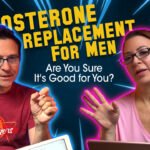In recent years, testosterone therapy for women has gained popularity, fueled by self-styled menopause specialists on social media platforms like Facebook and Instagram, as well as celebrity endorsements. The claims associated with this therapy are numerous, ranging from transforming libido to reducing brain fog, improving energy and mood, staving off dementia, enhancing bone strength, and maintaining muscle mass. However, it is essential to scrutinize these claims and evaluate the available scientific studies before considering testosterone therapy for women.
Outline
- Media Dominance
- Benefit Claims: fog, mood, energy, dementia, bones, muscle
- Medical Studies on Claims
- Women Exploited?
- Risks & Side Effects
- Testosterone Over A Woman’s Lifespan
- Where does Testosterone Come from? – Conversion
- Ovary Function – Menopause
- Reasons to Prescribe
- Clinical Trial Results
- ‘T’ Levels Don’t Always Correlate With Symptoms
- Reasons To Promote – Profit
- FOMO
Want More?
If you want more, check out our BLOG here!
Sources
Is the Male Sex Hormone Putting Mid-Life Women at Risk?
Testosterone for peri- and postmenopausal women
Yen & Jaffe’s Reproductive Endocrinology – Physiology, Pathophysiology, and Clinical Management
Androgen levels in adult females: changes with age, menopause, and oophorectomy
Global Consensus Position Statement on the Use of Testosterone Therapy for Women
Testosterone Levels Don’t Drop Sharply in Menopause
The Role of Testosterone in Women’s Health
Gene CYP19a1 – Responsible for making enzyme Aromatase
Susan Davis Is testosterone the answer to low libido | INTERVIEWS WITH MARLA SHAPIRO – for women
Ladies, are you curious about all the latest news and social media about testosterone and how it can raise your sex drive?
Are you aware of the risks? Do you know how it works in your body? Stay tuned because this episode we’re gonna cover all you want to know about testosterone and women
Welcome to Swinger University. I’m Ed. I’m Phoebe.
In recent years, testosterone therapy for women has gained popularity. Fueled by self-styled menopause specialists on social media platforms like Facebook and Instagram, as well as celebrity endorsements. The claims associated with this therapy are numerous ranging from transforming libido to reducing brain fog, improving energy and mood, staving off dementia, enhancing bone strength, and maintaining muscle mass. However, it is essential to scrutinize these claims and evaluate the available scientific studies before considering testosterone therapy for women. Consider subscribing to our channel so you don’t miss any of our episodes. Check out the podcast because we have sexy extra content that you won’t get here on YouTube. If you like our show, tell a friend about it. Also, be sure to check out the other related articles to this topic. If you’re a super fan of our show, consider supporting us on Patreon. As a member, you’ll have access to exclusive content that’s even hotter than what we share on the podcast. Well, we’re onto our favorite topic, which is social media, media…
I know.
HRT, all of that. I know. It’s a challenging subject because it’s it’s very controversial and a lot of people do see benefits from it, but it can be somewhat risky.
I haven’t talked with many people that don’t see benefits. I might be the outlier.
So, but we’re gonna dive into all kinds of details for you on hormone
testosterone for women. Some of the claimed benefits are it transforms your libido. And I hear this from a lot of women and I will say once I got my numbers dialed in right, which took me about two years, it did change things for me. It did. It did change things. But it was really, really difficult to get me at that right number.
And a lot of the work was done by me.
Getting them, telling my doctor, I want the tests, doing the research, looking at my numbers and telling them exactly what I wanted them to prescribe me and then paying them. Right. Beyond just telling them how you were feeling, it was also suggesting changes to the dosage, lowering it, raising it, etc. Actually, it’s just been lowering it. Yeah, it’s mostly been lowering it. The other claim benefits, which I don’t have any experience with, and is reduced brain fog, improving energy, which other people do. My friends say that that does improve their energy. I think I did notice that as well. And I’ll go into that in a second. Improvement in mood staves off dementia, improves bone health, maintains muscle mass, which makes sense. Testosterone does help. It helps you grow muscle faster. And I don’t know if it helps you maintain it. I know it helps you grow it quicker.
And then some of the trials have actually said that it does improve sex drive. And there are some case studies that refute the benefit to cognition, bone health, muscle waste, and mood. So. So your mileage will vary. Studies on the claims of fog, mood, energy, dementia, bones, and muscle. There’s been studies in 2005, 2014, 2018. These are meta-analysis of 54 studies they did in 2005. They did another meta-analysis of 35 studies in 2014. And then the International Menopause Study Society did another study in 2019. And they all said there’s no benefits to fog, mood, energy, dementia, bones, or muscle. So. Interesting.
It’s controversial. Yeah. And I mean, with most things, it could be chalked up to placebo. If you’ve got peer-reviewed studies showing no results from it or statistically not significant results, then the results that people are feeling about some of this stuff, I think the only one that they would know would be maybe the muscle waste or mood. Yeah. Because it’s hard for an individual to judge whether their cognition is improving or not, or whether their bone health is improving or not, or. Yeah. It’s challenging. Now back to the improved energy, my friends say they do see improved energy and they notice dramatically when it drops off after their three month or four month, if they’re doing a pellet when they go in, they’ll know immediately they say when it like drops off like a cliff for them. For me, I don’t notice that. In fact, I’ve noticed that my levels were so high that I now, and I’ve actually let it mostly run out of my body because I want to get back to ground zero again. And I’m going to start with something different. I’m still experimenting because I haven’t found the right method for me and the right result. And I’m not sure where I really want to go at this point, but we’ll say that the levels have dropped way down. I feel more calm and relaxed. And I think it’s because I’m getting better sleep because I’m not amped up and high energy, so to speak, all the time. And that’s one of the side effects that we’re going to talk about later is your sleep. It’s interesting because like most trends or things that catch on, there’s always a risk or an opportunity for people to exploit the trend.
And you’ve got all kinds of people who are pushing hormone gels as the answer to everything, right? Like it’s this panacea, it just solves all of your problems. You’ve got hormone specialists that have driven this testosterone stories and evidence through the roof in terms of social media as this one… Testosterone solves all of these problems, right? It’s this one size fits all solution. And it’s not really the case. No. And you also want to be aware of people who are in it for the money. For example,
there was a textile engineer who bought a HRT clinic. He was being interviewed on another podcast. He’s a textile engineer. Okay. So not a doctor, not an endocrinologist, not an internal medicine. Not any kind of doctor or nurse. And he’s spouting off claims like, well, the female body converts fat to testosterone. And when our testosterone is up, we feel younger and the body doesn’t need estrogen, but it needs testosterone. Well, I don’t know what all that means. I don’t… Sounds…
I’m skeptical. If you consider that if female bodies could convert fat to testosterone, anybody who was slightly overweight would start growing muscle faster if you believe all of the claims about testosterone, which would then burn the fat off. And you’d be one very horny woman. Right. So that doesn’t seem to match up. The only one that kind of sounds
legitimate is you feel younger, maybe meaning you have more energy. Could be more energy potentially, yeah. But I’ve never found anything in any research that claims that fat is converted to testosterone or that our body doesn’t need estrogen. So here are some of the risks when you’re taking testosterone. Sometimes the risks are higher based on the level that you’re taking. Or your physiology or your body chemistry. Correct. Right. You’ll have excess hair growth on your body. This could be around your breasts, the inner thighs, the pubic region, your chin, your upper lip, even your face. Back of your neck. I have not heard that. But I have heard some of my friends say it’s worth it and they literally shave their face. They will shave. They don’t care. Right. When my levels were really high and very uncomfortably high. For me, it was embarrassing to have hair in places I’ve never seen it before. It was crazy and I did not like it. If your levels are really high, you can actually lose hair on your head. Also had another swinger friend say that her levels were so high, she lost all her hair. And she actually works in the clinic that sells hormone therapy to women. Interesting. So she was quite the guinea pig, apparently for this. And they thankfully dialed it all in. But that’s shocking. It’s very shocking. I’m not willing to go to those lengths for testosterone. And we’re going to tell you why some of the women are going to those lengths for testosterone. Yes. You will have increased acting. Not everyone. I did horribly, but some women don’t. I know friends whose voice have changed. The texture of your skin will change. My skin, my arms felt rough and mealy, not soft. My skin on my face felt hard or thick or rough. You can get, oh gosh, you pronounce this one. Clitromegaly. Yes. Where your clit is permanently enlarged. Yes. And some women want this and I’m totally okay with it. It kind of looks neat. If you ever want to see what some very large clits look like, you need to join the Reddit group. I can’t remember which one that is, but there is a Reddit group for large clits. And some of my friends are obsessed with the photos on there. Obsessed. If you don’t want that, you know, that’s something to consider. You can also experience rage. So if your dosage is not correct, it acts like an anabolic steroid where you have roid rage. My doctors had no idea about this. Of course, I had to go do the research because why that happened to me as they practiced on me. Yes. My levels of testosterone. So literally, I did not drive for about a month because the rage would spontaneously kick in while I was driving. And it felt very weird. It felt very scary. And I had to pull off to the side of the road a few times and take a deep breath because I didn’t know what the heck was happening to me. That’s scary. And do you remember when I had to apologize for you every single day for about 40 days? I know I’m not acting correctly. I can’t help it. I love you anyway. And yes, I do remember. So it was a very, very scary time for me. And this is when my testosterone was not balanced correctly. Crazy high. You will experience an increase in muscle mass if you’re working out, right? So it is a very, very scary time for me. It boosts, it helps you grow muscle faster, just like it does for men. A lot of people in the gym will take testosterone to help grow muscle faster. Women will do that as well. If you take too much, there is a risk of having heart disease or stroke because your muscle, your heart is also a muscle, so you have to be cautious. And then we get to the sleep. Are we almost done to the end of the risk? Yes, almost two more, two more reduces your sleep because you’re so high energy and amped up all the time. You can’t get that deep sleep that you need to get a fully rested, relaxing respite every night. So you’re actually losing sleep, which isn’t great and causes other problems. Correct. And then lastly, there are the addiction stories.
Yes, there are. I know. And they’re mildly amusing. I mean, it’s… Yeah, they are. It’s hard to laugh at addiction, but when you hear these women describe their feelings about it, it really does sound like an addiction. Yeah. It’s kind of crazy. It’s… Yeah, I probably know five women that just have to have it because they want to orgasm
three times a day, always or more. They have to. They love that feeling. They love the euphoria of the orgasm, which I totally get. Those are those natural euphoric hormones that release when you have an orgasm and they want… Everybody loves orgasms. Right? And they want that every single day, sometimes more, mostly more than once a day. And when they don’t have it, they’re very upset about it, like very upset. And that was kind of the trigger for me. I was like, “Why are you so angry about it? You missed a day. Oh no. Oh no, and I’m like, okay.”
To the point that one of the stories that we’d heard was a woman who was taking so much testosterone that her doctor actually told her to lay off because she was taking far too much, trying to chase that sensation, that feeling. Yes, yes, yes. So into some history of testosterone in the body and what’s normal and what’s not. Do we have it?
We’re talking about replacing it. So theoretically, we had it and it went away. And so we’re replacing it. So we got to put it back in because it’s missing. Yeah. Or did it go away? Right before menopause, women’s testosterone peaks at like three times higher than it was before menopause, before the start of menopause, so before perimenopause. And it kind of makes sense because you hear about women being in their sexual prime in their 30s and 40s. So their testosterone levels are up from where they were before. Right. I would even say closer to your 40s because there’s that range in between your childbearing years where it’s actually lower. You will also find your testosterone is higher right before your menstrual cycle, which might explain why I was always super horny right before my period. And I always knew when it was coming because I was really, really horny. Interesting. So that correlated for me. That actually makes sense too, because that’s right around the time that you’re ovulating, which means that you’re right before getting pregnant. So if you increase your sexual desire, that means that you’re going to have sex and probably get pregnant as a result.
Technically, I’m not sure when the egg has dropped and the lining is ready to shed, but
it always seemed like a few days before. I don’t know if it’s that close. But if it is, that would make sense. Your testosterone also changes during the day through your circadian natural cycle. And it increases the dopamine for your brain health and for pleasure. But it also declines a little bit around menopause, but that is also up for debate. It doesn’t. Interesting. Yes, it doesn’t drop sharply as many are led to believe, but it does gradually decline over our ovulatory years. It can remain stable right before and after menopause.
And there’s a tiny little increase right around your seventies, which gave me a chuckle because I thought, wow, that might explain those kinky people in the retirement homes where everyone’s running around, making whoopee with everybody. Retirement home orgies that we hear about.
Bingo.
There was a study of about 1,400 women from ages 18 to 75 where there is a… It showed the deepest drop and not a cliff, but a deeper drop off of testosterone in those early productive years. Interesting.
The age-related decline. It’s greater before age 25 and levels off before menopause. Interesting.
So you will have some stability for several years before and after menopause, which is great. So the narrative that you don’t have any loss and it’s dropped? No. I mean, it’s not accurate.
So I’m not sure why people are being prescribed testosterone for other reasons, other than the libido because science has backed that up in a few studies about it increasing libido. I have noticed that as well.
So if there aren’t any other factors in your life and you want to kick that up a little bit, why not? It’s just a bit risky and it’s a lot of work to get the right dose. Right. Right. Let’s get into some anatomy. So where does testosterone come from? Well, it’s a conversion from a group of hormones called orandrogens. Your ovaries produce about 25% of the testosterone.
And then after, once you hit menopause, then about 50% of your testosterone is actually produced in your ovaries. And if you have your ovaries removed, you’ll see a very rapid drop in your testosterone levels, which makes sense because if it’s somewhere between 25 and 50% of your testosterone, you’re going to eliminate that one production source. Right.
And what is interesting is that your adrenals will compensate if you lose your ovaries. So your adrenal glands account for another 25% of production.
There’s a further breakdown process, more of an active form where testosterone is in the blood. It gets converted again into other forms and then that gets converted into estradiol. So it’s this very complex process in your body with hormones coming from tissues, organs, other glands, the brain.
And so it’s no wonder that getting the right combination of hormones is very, very complicated. And it’s going to highly depend on the type of person that you are in your genetic background and whether you have two ovaries or you don’t, or you’re overweight or you’re not, or you’re whatever. Right.
Yes.
Now you have conversion factors, right? Which I talked a little bit about the type of tissue you have, the level of receptors that you have in your body, the activity of the enzymes. Also play a factor, which was fascinating to me. So aromatase is the most active enzyme for testosterone. And the female body for your ovaries is where that enzyme type tends to process the testosterone. And in the male body, it is the fat, not the female body. So that textile engineer got his gender wrong. Well, you know, figuring out male versus female and all that, I mean, that’s important for a textile engineer. I know. And you guys suck because that means any little fat that you have just converts to testosterone, which gives you more muscle. I’m not convinced of that either because if you look at gentlemen who are a little bit heavier weight, they tend to have lower testosterone. That’s true. So and if you consider exercise and fitness and muscle producing more testosterone, because I always tell you if you’re low, if you’ve got low T, you should be exercising. That’s true. So sitting around eating pizza is not generating testosterone.
Right. Right. Right. These are different types of conversions that can happen in the body. And there is an enzyme that does that will help with that. Either you have it or you don’t, I think.
But the point is it gets complicated. Yes. And it differs from body to body. Yes. Let’s go with that.
Because you may have higher levels and the higher amounts are going to have you more testosterone and yes.
So there you go. So what are the reasons to prescribe testosterone? Let’s kind of break these down a little bit.
Your hormone levels don’t necessarily tell you whether it’s important or not. In other words, just because it’s at a number doesn’t mean that that’s the number that you’re supposed to have or isn’t the number that you’re supposed to have. Like is it low? Is it high? That’s very dependent on an individual person. So as an example, my testosterone levels are fairly high and they’ve always been fairly high. But when mine dropped, I didn’t notice that I was feeling any different. So hormone levels, not necessarily an indication that you’re missing something. It’s just different.
Yeah. Right. It’s fascinating to me. And once again, that effect of the hormone really depends on the type of receptors that you have. Only the unbound testosterone is free to act on your tissues and unbound is much lower than estradiol.
So, you know, how, again, it’s a bit complicated. And there’s no clear indicators just by looking at numbers as to whether it’s high or low.
That’s true. So, you know, why is it really being prescribed when you’re talking about women and menopause? Is it pharma or urbuh? Are they trying to make a buck?
I mean, yes, partially, I think, mostly. If you’re low libido, other factors that contribute to that haven’t been addressed, then,
you know, maybe testosterone, but, you know, mental health factors into that, physical health factors into that. Right. Your nutrition factors into that. What are you eating? Right. We’ve talked about exercise as being a producer of testosterone, but exercise also produces endorphins and other happy hormones and things that make you feel better. Right. Which we know helps with sex. Like everybody who’s ever read Cosmopolitan knows that exercise is good with producing higher sex drive. Right.
So, you know, back to the money-driven part, it is a factor, obviously. You can go to a private practice who’s offering HRT and get your testosterone there. You can also find it at your local gym from your, you know, gym rats. Oh, scary. Your guys that are getting it. I don’t know where they get it from. I’m always fascinated by that. I have friends that get it from their trainer, two friends that get it from their trainer. I didn’t ask how exactly that happens because I am fascinated by the whole behind the scenes how does that work? Yeah. Does it fall off of a truck? Like how does that work? And the bigger question that I have in my head is we get tested because of, to check our levels, to make sure that they’re not too high or too low and that the other things, which I won’t get into because it’s in the men’s episode, aren’t happening. Like you need to test your results to make sure that you’re not exceeding what your body should have. Right. It’s very profitable. You know, they can charge luxury prices and they can charge for the labs. You can get it cheaper from your gym rat trainer guy and you can actually get it cheaper through your own doctor, regular primary care provider or OBGYN. Right. Because typically insurance does cover testosterone shots if you want to do injectables. Yes, it does.
They might, they do creams, I believe they’ll cover the creams as well. So something to consider.
When you’re evaluating the success, you’ve moved on and you tried it. They say that if, you know, your libido should kick in in about four weeks and peaks at about three months.
And if you don’t see any improvement in six months, just stop. It’s not going to, it’s not going to happen. It’s not going to happen. Your T levels, as we talked about, aren’t always going to correlate with your symptoms. You could have 10 women with 10 different results. That’s why getting some labs to follow some numbers as key indicator points to kind of guide you in your decision making process along with your, how are, you know, your mental, your own analysis, how am I feeling? Right, right. Well, in conclusion, the fear of missing out is real. A lot of people are jumping on this bandwagon for getting testosterone.
Make sure that you do your research, talk to your primary care physician, and if you can,
consult an endocrinologist so that they can deal with you and your specific hormone needs.
Thanks for tuning in to Swinger University. Until next time, stay curious and keep learning.
You won’t want to miss out our next episode where we will discuss hormone replacement therapy for men. We love getting questions from our audience and you can leave us a voicemail at 916-538-0482 or contact us at swingeruniversity.com. Tell us your name, age, and where you live, or you can be anonymous.

























